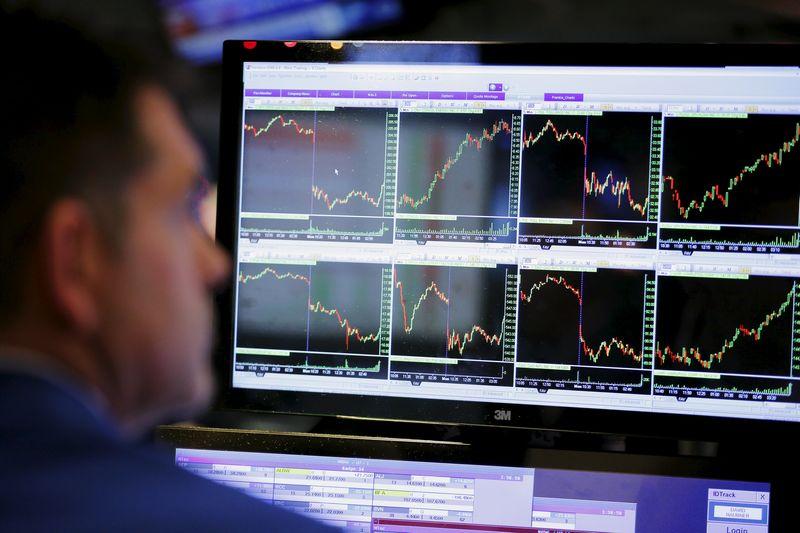Investing.com -- The spotlight is on the U.S. consumer today, with October retail sales data coming out within an hour or two of earnings from Walmart (NYSE:WMT) and Home Depot (NYSE:HD). Bitcoin and other cryptocurrencies tumble as the market absorbs the fact that the final version of the Infrastructure Bill included some potentially onerous reporting restrictions. Elon Musk continues to sell Tesla (NASDAQ:TSLA) stock, but at least Michael Burry has stopped doing the same. The International Energy Agency accepts that the tide is turning for oil, and sterling leaps after strong U.K. labor data put a December rate hike back in play. Here's what you need to know in financial markets on Tuesday, 16th November.
1. Retail day
How strong is the U.S. consumer feeling heading into the holiday season? We’ll find out at 8:30 AM ET (1330 GMT), when retail sales data for October are reported. Analysts expect a 1.2% rise from September, which would be the biggest monthly rise since March, when the U.S. lifted most of its lockdown restrictions on stores.
There’s an implicit tension between that forecast and the University of Michigan’s consumer sentiment index, which fell to a 10-year low at the start of this month. It can be partly explained by the fact that much of the increase in retail sales is due to rising prices ( Tyson Foods (NYSE:TSN) on Monday became the latest company to announce blandly that it is passing on higher input prices to customers).
The nationwide data will probably find echoes in earnings from Walmart and Home Depot, both of which report early.
2. Musk keeps selling but Burry throws in the towel
Elon Musk continued selling Tesla stock on Monday, according to filings released late in the day. The CEO Musk sold 934,091 shares, worth around $930 million, after exercising options to buy 2.1 million shares previously granted as compensation at $6.24 each.
He is required to pay income tax on the difference between the exercise price and the market value.
Tesla stock fell 1.2% in premarket. However, there’s one less person selling the stock – Michael Burry of ‘The Big Short’ fame, whose Scion Capital hedge fund has closed its short position on both Tesla and Cathie Wood’s ARK Investment, apparently after tiring of ‘being right too early’.
3. Stocks set for flat opening after Biden-Xi call
U.S. stocks are set for another flat opening after a lackluster day on Monday when they struggled for direction. The extended telephone call between Presidents Joe Biden and Xi Jinping produced some positive mood music, but little in the way of hard news.
By 6:15 AM ET, Dow Jones futures were down 3 points, effectively flat, while the S&P 500 and Nasdaq 100 futures contracts were both down by less than 0.1%.
In addition to Walmart and Home Depot, stocks likely to be in focus later include Chinese gaming company NetEase (NASDAQ:NTES), which has revived plans for an IPO of its music business according to The Wall Street Journal. The company’s earnings fell somewhat short of expectations but revenue came in ahead of forecasts.
4. Crypto slumps at realization of reporting requirements in infrastructure bill
Cryptocurrencies sold off across the board as the market digested the implications of a clause in the infrastructure bill that threatens heavy reporting requirements on the transfer and receipt of such funds.
The bill mandates that digital asset transactions over a value of $10,000 must be reported to the Internal Revenue Service, something that will increase the administrative costs of many crypto brokerages as well as inhibiting the trade in illicit goods and services that generate the bulk of ultimate demand for crypto.
By 6:25 AM ET, Bitcoin was down 8.6% at $60,284, having earlier dipped as low as $58,655. Ethereum was down 10%, Litecoin was down 14% and Cardano was down 9.2%.
Back in the world of real currencies, sterling perked up after strong U.K. labor market data put the prospect of a rate hike at the Bank of England’s next meeting back on the agenda.
5. Oil bucks bearish IEA report. API inventories due
Crude oil prices rose overnight, despite fresh indications that the global supply-demand balance may finally be turning in the favor of consumers.
The International Energy Agency said it expects global oil supply to rise by an average of 1.5 million barrels a day over the final two months of this year, helped by a 400,000 barrel-a-day increase in U.S. output. It also assumes that OPEC and its allies pump the volumes that they have promised to pump – despite the bloc missing its targets for the last two months.
By 6:25 AM ET, the January U.S. crude futures contract was up 0.5% at $80.13 a barrel, while Brent crude was up 0.6% at $82.56 a barrel. The American Petroleum Institute’s weekly inventory data are due at 4:30 PM ET, as usual.





